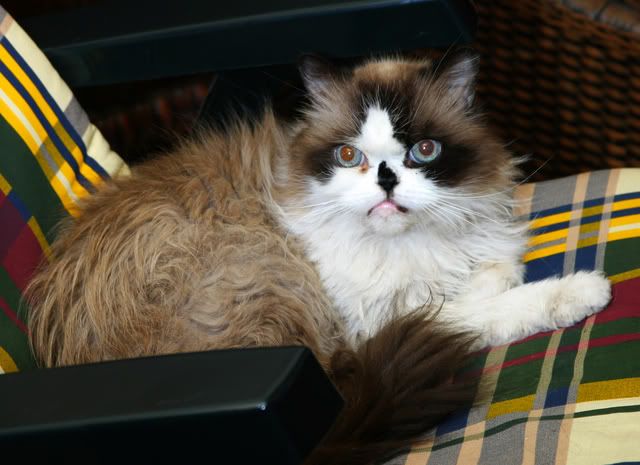 Recently someone was expressing her concern over the fact that their 16 year old cat was urinating where she slept. This is an abnormal situation that I suspect indicates either illness or dementia.
Recently someone was expressing her concern over the fact that their 16 year old cat was urinating where she slept. This is an abnormal situation that I suspect indicates either illness or dementia.
In some cases older animals will lose control of their bladder or bowels. It helps to put them on a feeding and toileting schedule. However I’d suggest taking the animal in for a veterinary check-up and consult with the veterinary before taking any further steps.
This week I’ve been talking about pet potty training issues specifically focusing on cats.
Cat urine marking behavior is usually not a litter box avoidance issue and usually is connected to sexual behavior and territorial marking behavior.
How do you tell the difference? Cat urinating is usually done on a horizontal surface. Common places are on towels, bath mats, or rugs.
However, cat urine marking or spraying is done on a vertical surface, such as walls, doors, windows, and the sides of furniture. I’ve seen cases where the cats have marked heat generating sources (even appliances) because it helps disperse the odor.
Phew!
Cat urine marking occurs when a cat backs up to a vertical surface, usually the animal with making pushing movements with the hind legs, and the tail will quiver before delivering a shot of urine. This action leaves a pheromone message for any other cats in the vicinity.
The pheromone label marks territory or signals breeding readiness to other cats. Urine marking occurs most commonly in intact male cats followed by neutered males.
However, intact females and even spayed females may mark in the right circumstances.
Territorial marking usually occurs on perimeter areas and sometimes on the personal belongings of a specific human.
To address the situation usually requires the help of an animal behaviorist after you rule out veterinary medical issues. (Are you getting sick of me repeating this?–It IS important!)
Once that is done, one of my first recommendations is to spay and neuter all the felines in the household. I could get into the reasons why this is a good idea but that is for another post.
If you have a multiple cat household you’ll need to make sure you have ample boxes (one per cat plus one), litter that they all like to use, and dispersed locations.
Also make sure your cats are getting lots of active playtime and that you have tiered perches and resting areas throughout the house.
If marking occurs on the drapes or around windows, you probably have an outside intruder disturbing the peace. You can frost windows or put up barriers to help reduce visual agitation.
I’ve already mentioned Feliway Spray and recommend it in marking cases as it creates a calming affect–but you also want to reduce the temptation to remark.
To locate marked areas, close the window coverings and use something like theUrine-Off Black Light. This will highlight the areas so you can clean them.
You might try Urine Off Stain & Odor Remover for Cats & Kittensor a similar product. Check with a local pet professional for their recommendations.
There is more to do and good behavior modification programs take about eight weeks to fully implement (in worse case scenarios) but it you don’t see quick results get the help of a good animal behaviorist.


I have a cat that is 7 years old he is genneraly a lap cat in every since of the word, he is a 20 lb. tabby that is very dominate yet has a very father nature about him, he loves to take care of my other cats and nutures kittens, however he has recently taken to urinating on our bed pillows, we have washed them daily and spraed the bed with deterant perfumes is there any reason or other thing we can do to deter him from this.
If you re-read the articles in the series you will find that you should get him into the veterinarian to rule out any problems. You can also make a phone appointment for specific help with this issue (see Hire Animal Expert).
Thanks for your comment.
I recently introduced a (rescued) 6 week old kitten to a 2-cat household. One adult cat is male 6 yrs, one is female 2 yrs (both altered). We think we may have to get rid of the new male kitten because he has urinated and had a bowel movement in our bed – TWICE! We assume he is trying to establish territorial rights. He has also taken over the female’s favorite sleeping spot. Can this kitten be broken from this unacceptable behavior? I don’t think I can ever trust him in the bedroom again. (Please email me the answer if you can because I’m not sure I will find this site again).
Thanks!
Leslie, please read the comment policy and visit the Hire Animal Expert link for further assistance. Thanks for stopping by but such issues usually require a history and a consultation not a simple email answer.